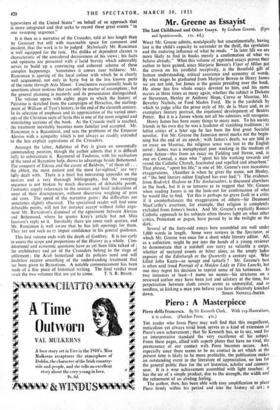Mr. Greene as Essayist
WHAT Mr. Greene admits, nostalgically but unsentimentally, having lost is the child's capacity to surrender to the thrill, the revelation
and the enduring influence of what he reads. " In later life we are more likely to find in books merely a confirmation of what we believe already." What this volume of reprinted essays proves their author to have gained, since Marjorie Bowen's Viper of Milan put the crown on his youthful receptivity, is the threefold gift of human understanding, critical assurance and economy of words. By what stages he graduated from Marjorie Bowen to Henry James we are not told, but James is the genius presiding over the book. He alone has five whole essays devoted to him, and his name occurs in three times as many again, whether the subject is Dickens or Stevenson, Henley or Anthony Hope, Corvo or Mauriac, Mr. Beverley Nichols, or Ford Madox Ford. He is the yardstick by which to judge alike the prose style of Mr. de la Mare and, in an exemplary literary portrait, the emotional development of Beatrix Potter. But it is a James whom not all his admirers will recognise.
Henry James has been many things to many men. To his society friends in his own day he was a laudator of vanishing traditions ; to leftist critics of a later age he has been the first great Socialist novelist. For Mr. Greene the Jamesian novel marks not the begin- ning but the end of an epoch ; with James's death, we are told in an essay on Mauriac, the religious sense was lost to the English novel; James was a metaphysical poet working in the medium of prose fiction—this from an essay on Fielding and Sterne, and, in one on Conrad, a man who " spent his life working towards and round the Catholic Church, fascinated and repelled and absorbent." That phrase, " spent his life," is one of Mr. Greene's rare incautious exaggerations. (Another is when he gives the name, not Henley, of " the best literary editor England has ever had.") The evidence, from Roderick Hudson to The Ambassadors, is discussed elsewhere in the book, but it is so tenuous as to suggest that Mr. Greene when reading James is on the look-out for confirmation of what he would like to find. Yet this is perhaps no grave fault in a critic if it counterbalances the exaggeration of others—Sir Desmond MacCarthy's assertion, for example, that religion is completely excluded from James's books. And Mr. Greene's explicitly Roman Catholic approach to his subjects often throws light on what other critics, Protestant or pagan, have passed by in the twilight or the dark.
Several of the forty-odd essays here assembled are well under 1,000 words in length. Some were reviews in the Spectator, of which Mr. Greene was once for a short while literary editor. All, as a collection, might be put into the hands of a young reviewer to demonstrate that a nutshell can carry as valuable a cargo, whether of nectared sweets or bitter aloes, as the amply laden argosies of the Edinburgh or the Quarterly a century ago. Who killed John Keats—so savage and tartarly ? Mr. Greene's best is often acid (read Portrait of a Maiden Lady or Film Lunch), but one may regret his decision to reprint some of his tartnesses. In two instances at least—I name no names—his strictures on a reviewed author may have been just and salutary at the time, but perpetuation between cloth covers seems as unmerciful, and as needless, as kicking a man you believe you have effectively kriocked






























 Previous page
Previous page